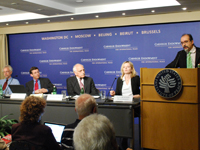Registration
You will receive an email confirming your registration.
As Israeli and Palestinian negotiators resume peace talks, a key factor in the success of a two-state solution will be the ability of Palestinians to take on the responsibilities of statehood. Palestinian Prime Minister Salam Fayyad’s government is midway through an ambitious two-year plan to build the necessary infrastructure for a viable Palestinian state. Carnegie and the United States Institute of Peace co-hosted a panel of experts to assess the progress of these reforms and debate their implications. The panel included Carnegie’s Nathan Brown, Neil Kritz from the Institute of Peace, Howard Sumka of the U.S. Agency for International Development (USAID), and former Palestinian negotiator Ghaith al-Omari from the American Task Force on Palestine.
Institutional Progress
Prime Minister Fayyad’s reform plan has shown important progress in several sectors:
- Security: Any future Palestinian state will need to ensure both domestic security and prevent threats to Israel. Palestinian security forces have greatly improved their capacity and earned the respect of the Israeli military, al-Omari said.
- Judiciary: The Palestinian judiciary has become increasingly professional, independent, and effective in resolving cases, Kritz noted. He added that citizen confidence in the judiciary has improved and fewer people are seeking extrajudicial solutions to their problems.
- Economy: The Palestinian territories saw a 7 percent rise in GDP in 2009 as well as significant business growth and reduced unemployment, Sumka explained. However, Brown cautioned that much of this growth was a result of increased foreign aid, not an improvement in the domestic economy.
- Government services: Governance in the West Bank is improving. Palestinian government officials are increasingly concerned with serving their people, Kritz contended. Sumka added that USAID has worked with five government ministries to modernize their facilities and improve their capacity to address the needs of their citizens.
The panelists agreed that the Fayyad cabinet had made some improvements in governance. Brown saw these as primarily administrative in nature and limited in comparison to the more significant institution-creation efforts that occurred in the 1990s and could not be called “state building.” Other panelists disagreed and viewed the current institution building process as unprecedented.
Politics: The Missing Link in State-Building?
Palestine is in the middle of a serious political crisis, which has the potential to undermine any progress in institution-building. This crisis has multiple manifestations: the Fayyad government does not control Gaza, which is run by Hamas; the Palestinian legislature has been unable to meet since 2007; and elections at every level have been repeatedly postponed. Brown argued that state-building is impossible without a functioning political process, while other panelists expressed hope that strong institutions could lay the foundation for a Palestinian state.
- Government legitimacy: The Palestinian government lacks a legislature or electoral legitimacy, which hinders its ability to build a state, said Brown. He noted that the Fayyad government must rule by decree and has focused as a result on technical and administrative changes rather than comprehensive reforms. Al-Omari responded that the Fayyad government has gained popular legitimacy by improving government services.
- Political opposition: Both Hamas and Fatah, the two major competing Palestinian political parties, oppose political reform because it threatens their power bases, al-Omari noted. Although Fayyad is not himself a member of Fatah, Hamas members have been purged from Fayyad’s government, Brown said.
- Self-reliance and foreign aid: Al-Omari argued that the current round of reforms has allowed the Palestinian government to move from a culture of victimhood to one of self-reliance. Brown countered that the Palestinian government is viewed at home as completely dependent upon foreign support and Fayyad himself was named prime minister only at the insistence of international actors.
- Sustainability of institutional reform: Carnegie’s Marina Ottaway noted from the audience that similar institution-building projects in the Balkans failed when governments achieved statehood and political interests became more pressing. Palestinian political parties and civil society have been left out of the reform process and, with no role in the process, they are unlikely to guarantee its future survival.
Institution-Building and the Peace Process
Al-Omari listed several ways in which institutional reforms could contribute to the peace process:
- Security guarantees: The increased capacity of the Palestinian state, and especially its security forces, has reassured Israelis and created a better environment for peace negotiations.
- Pressure for statehood: As international institutions such as the World Bank increasingly recognize the ability of Palestinians to govern themselves, Israel faces increased pressure to make progress on Palestinian statehood.
- Safety net: Strong institutions could provide a safety net if negotiations were to collapse, allowing Palestinians to retain hope of continuing progress on statehood, although al-Omari warned against complete unilateralism.
At the same time, key challenges remain:
- Legitimacy: Without political legitimacy, Brown argued that the Palestinian government has no way to negotiate, ratify, or implement a peace agreement.
- A failed peace process would undermine reforms: Much of the institutional reform project is driven by the hope that better institutions will eventually lead to Palestinian statehood. If peace talks fail, Palestinians may see their reforms as primarily helping Israel to meet its security needs rather than advancing Palestinian interests. There is a particular danger of Palestinian security forces losing faith in the process and ending security guarantees for Israel, Kritz concluded.
